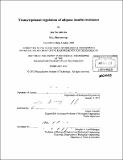| dc.contributor.advisor | Ernest Fraenkel. | en_US |
| dc.contributor.author | Lo, Kin Yui Alice | en_US |
| dc.contributor.other | Massachusetts Institute of Technology. Dept. of Biological Engineering. | en_US |
| dc.date.accessioned | 2012-07-02T15:43:29Z | |
| dc.date.available | 2012-07-02T15:43:29Z | |
| dc.date.copyright | 2012 | en_US |
| dc.date.issued | 2012 | en_US |
| dc.identifier.uri | http://hdl.handle.net/1721.1/71466 | |
| dc.description | Thesis (Ph. D.)--Massachusetts Institute of Technology, Dept. of Biological Engineering, 2012. | en_US |
| dc.description | Page 168 blank. Cataloged from PDF version of thesis. | en_US |
| dc.description | Includes bibliographical references (p. 155-167). | en_US |
| dc.description.abstract | Insulin resistance is a condition that underlies type 2 diabetes and various cardiovascular diseases. It is highly associated with obesity, making it a pressing medical problem in face of the obesity epidemic. The obesity association also makes adipose tissue the target of interest for ongoing research. Previous work on adipose insulin resistance has largely been focused on deciphering the signaling defects and abnormal adipokine secretion profiles. There is increasing awareness that transcriptional control is a source of dysregulation as well as an avenue of therapeutic intervention for insulin resistance. However, knowledge of transcriptional regulation and dysregulation of adipose insulin resistance remains fragmentary. Here, we present a genome-wide perspective on transcriptional regulation of adipocyte biology and adipose insulin resistance. We made use of the latest high-throughput sequencing technology to interrogate different aspects of transcriptional regulation, namely, histone modifications, protein-DNA interactions, and chromatin accessibility in adipocytes. In combination with the transcriptional outcomes measured by microarray and RNA-sequencing, we (1) characterized a largely unknown histone modification, H3K56 acetylation, in human adipocytes, and (2) set up four diverse in vitro insulin resistance models in mouse adipocytes and analyzed them in parallel with mouse adipose tissues from diet-induced obese mice. In both cases, through computational analysis of the experimentally identified cis-regulatory regions, we identified existing and novel trans-regulators responsible for adipose transcriptional regulation. Furthermore, by comprehensive pathway analysis of the in vitro models and mouse models, we identified aspects of in vivo adipose insulin resistance that are captured by the different in vitro models. Taken together, our studies present a systems view on adipose transcriptional regulation, which provides a wealth of novel resources for gaining insights into adipose biology and insulin resistance. | en_US |
| dc.description.statementofresponsibility | by Kin Yui Alice Lo. | en_US |
| dc.format.extent | 168 p. | en_US |
| dc.language.iso | eng | en_US |
| dc.publisher | Massachusetts Institute of Technology | en_US |
| dc.rights | MIT theses are protected by copyright. They may be viewed, downloaded, or printed from this source but further reproduction or distribution in any format is prohibited without written permission. | en_US |
| dc.rights.uri | http://dspace.mit.edu/handle/1721.1/7582 | en_US |
| dc.subject | Biological Engineering. | en_US |
| dc.title | Transcriptional regulation of adipose insulin resistance | en_US |
| dc.type | Thesis | en_US |
| dc.description.degree | Ph.D. | en_US |
| dc.contributor.department | Massachusetts Institute of Technology. Department of Biological Engineering | |
| dc.identifier.oclc | 795184397 | en_US |
